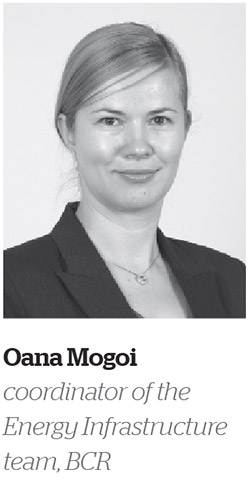Being the largest bank in the Romanian banking system, BCR is a powerful partner that supports the development of Romanian economy, especially infrastructure development, including in energy. In the recent years, the most dynamic energy sector was that of renewable energy, almost the entire investor attention focusing in this direction. So far, ERSTE group and BCR have funded renewable energy projects in Romania totaling over 400 MW and covering the areas: micro-hydropower stations, wind and photovoltaic projects, as well as biogas power plants.
 Renewables are out of focus
Renewables are out of focus
Funding was made taking into account the legal framework at the time of granting such funding, framework which set a support scheme for 15 years, based on granting a number of green certificates, depending on technology, for each MWh produced. Thus, the funding structure results from the calculation of certain financial parameters that were based on the applicable legislation. With its change, the financial parameters were not met, and projects started facing serious liquidity problems, having no other source to offset the reductions of income from green certificates and the increased operating costs. For this reason, as well as due to uncertainty and lack of predictability of projected cash flows, BCR has given up for the moment the financing of new renewable energy projects. A new opportunity could be the “feed-in tariff” scheme, for capacities of up to 0.5 MW, but it should be analyzed to what extent the level of this tariff, currently unknown, would make the development and financing of such projects sustainable.
Stability is a prerequisite
From our experience as group with international presence, we understand that this type of support schemes can be overcome by market evolution, but in order to maintain the confidence of investors and financiers, we believe that legislative changes should relate only to future investments. Thus, one of the basic conditions for granting project funding over a long period of time is the legislative stability and observing the principle of non-retroactivity of laws enforcement.
The promise of cogeneration based on biomass
A special attention should be given to the thermal energy sector, being one of the most deficient areas in Romania. In this context, projects that could bring a significant contribution are especially those of biomass cogeneration, especially considering the huge potential of biomass that Romania holds. Unfortunately, the applicable support schemes (the cogeneration bonus and green certificates) are not enough for projects to be attractive for investors (in many cases incomes generated don’t cover the operating costs, funding costs and the investor’s margin), investments in this field being much surpassed by those in the field of wind and photovoltaic energy.
In general, these projects have a high degree of complexity, in addition to the investment in the actual power plant investors being required to assess other aspects: the degree of wear of the thermal power network, the degree of collection of network operator from consumers regarding the tariff for heating, possibility of connection/disconnection from the central heating system. Integrated projects will always have the ideal situation in this regard, in which the investor controls both the supply source of the power plant (energy crops, waste etc.), the actual power plant and the thermal energy distribution network.
Energy efficiency still awaits the secondary legislation
Besides the renewable energy sector, BCR permanently monitors the directions set by the European Union, focusing on areas of common interest. In this context, BCR currently analyzes the possibility to finance energy efficiency projects supported by ESCO-type companies, in both public and private areas. In this regard, it’s absolutely necessary that all stakeholders of such projects have the main purpose and the same understanding, and the running principle be a correct risk allocation. Also, for the application of Law 121/2014 on Energy Efficiency, transposing the European Directive 27/2012, the secondary legislation should also be issued, which would bring more details in this area. We look forward to launching pilot projects in the public sector, which should be a model for accelerating investments in energy efficiency.
Funding for oil and gas exploitation
Another area explored by BCR is oil and gas exploitation, especially in view of the market liberalization process. Although in Romania there is an old tradition in the exploitation of such resources, “reserve based lending” was almost nonexistent, the number of market players not allowing its development. Market liberalization first means the opening of the market to competition and implicitly a greater number of investors and projects and, thus, a greater financial effort. In this context, attracting bank funding will be an absolutely necessary element for the development of projects in this sector.
As a general principle, bank funding starts in the development phase of projects, the exploration phase being the investors’ concern. This development phase takes place after the end of experimental exploration and approval by the National Agency of Mineral Resources of the exploitation project, based on confirmed reserves and declaring the commercial nature of the field. Also, bank funding can be granted in the case of mature fields, which go through a production improvement process (funding “Enhanced Production Contracts”).
BCR takes into account the National Investment Plan
Last but not least, BCR is a traditional financier of conventional energy projects, because any country must first assert their own resources and achieve that mix of energy resources to bring the best efficiency of the system and the much desired energy security. An important starting point in this context is represented by projects eligible for grants from the National Investment Plan, BCR being interested in participating as co-financier.
Support for attracting European funds in Romania is another important area of interest for BCR. The bank has provided cofinancing of about 1 billion euros, including in energy.
Banca Comercială Română (“BCR”) is part of Austria’s “ERSTE” Group, one of the most important financial institutions in Central and Eastern Europe, with over 16 million customers in eight countries. BCR manages assets of over EUR 15 billion, being the main provider of services in Romania and the most valuable financial brand in Romania.
—————————————————-
The full version of this article can be read in printed edition of energynomics.ro Magazine, issued this November.
In order to receive the next issue (March 2015) of energynomics.ro Magazine for free, we encourage you to write us at [email protected] to include you in our distribution list.
